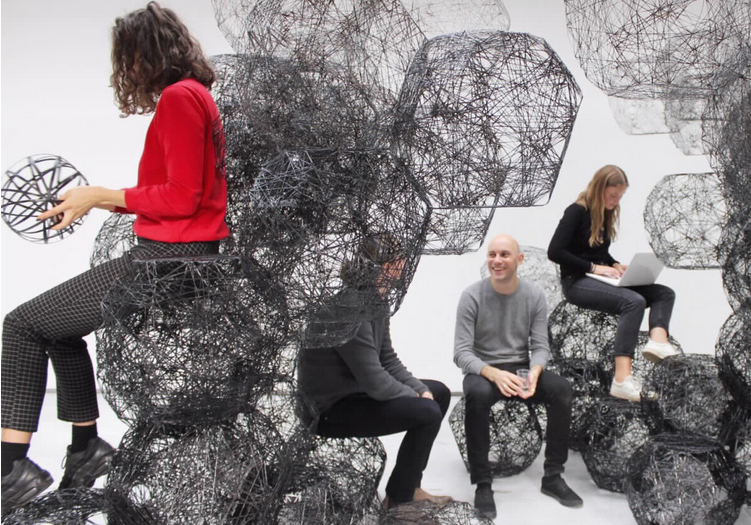Current Projects
BatteryPass-Ready
Advancing EU Battery Passport Readiness
The EU Battery Passport
Batteries play a vital role in achieving a sustainable energy supply – not only in the realm of industrial energy storage but also for e-mobility. Starting in February 2027, the battery passport will become mandatory under EU regulations. It will enhance transparency of data throughout the entire battery lifecycle – from production to usage and increased circularity. This presents a challenge for battery providers and manufacturers: they will have to adapt their data management systems and establish the technical infrastructure required for the battery passport. For small and medium-sized enterprises (SMEs) with limited resources, these demands are significant hurdles.
Testing, Analyzing, and Preparing for the Mandatory Battery Passport
To support such companies, the BatteryPass-Ready consortium is developing a testing environment that will ease the implementation of the battery passport along the entire value chain and provide greater security in the process: During development, manufacturers and service providers can verify whether their solutions comply with EU standards, ensuring smooth integration with the planned system.
Completed Projects
© Battery Pass
© AdobeStock/Petair
© Bosch/C-ECO
© scyther5/istock
© Mohit Kumar/Unsplash
-
Sustainability and transparency in the battery supply chain
Electromobility is the key to climate-friendly mobility. In Germany, the government has set the goal of getting 15 million electric vehicles on the road by 2030 in order to achieve the climate targets. Accordingly, the ramp-up of electromobility will continue to gain momentum in the coming years. With the increasing number of electric vehicles, the demand for lithium-ion batteries for the vehicle drive system (traction batteries) is also growing. As an essential component of the electric vehicle, it is becoming increasingly important that these batteries are produced, used and recycled sustainably.
The consortium project Battery Pass aims to contribute to an EU and globally harmonised applicable battery passport by the end of 2024. The project includes content-related and technical standards, coordination with stakeholders, demonstration and analytical benefit assessment. The development of scientifically sound content, co-developed by industrial partners and validated by civil society actors, will ensure maximum acceptance and benefit.
The Battery Passport supports the sustainable and circular management of vehicle traction batteries by providing a digital infrastructure for the documentation and exchange of basic information and update-relevant technical data. In particular, data that comprehensively describe the sustainability and accountability of the supply chain, such as GHG footprint, working conditions in raw material extraction and battery condition determination, are documented.
-
In dialogue for a secure and sustainable supply of metals and industrial minerals from secondary raw material sources
Germany’s supply of secondary raw materials will continue to gain in importance in the future. The recycling of raw materials can not only reduce Germany’s dependence on raw material imports, but also achieve a reduction in greenhouse gas emissions to support climate protection.
In dialogue with industry, science and administration, options for action will be developed within the framework of the Dialogue Platform on Recycling Raw Materials (Dialogplattform Recyclingrohstoffe), aiming at improving the secure and sustainable supply of German industry with metals and industrial minerals from secondary raw material sources. This can strengthen Germany’s competitiveness and innovation leadership and accelerate the achievement of the greenhouse gas reduction target laid down in the Climate Change Act.
The Federal Ministry for Economic Affairs and Energy (BMWi) has commissioned the German Mineral Resource Agency (DERA) at the Federal Institute for Geosciences and Natural Resources (BGR) with the implementation of the Dialogue Platform on Recycling Raw Materials. The office of the platform is managed by DERA and acatech, as scientific partners.
-
Used part recycling: Artificial intelligence paves the way
The joint project EIBA was launched in September 2019 with the aim of developing a system that evaluates the condition of returned cores with the help of artificial intelligence (AI).
Currently, the identification and evaluation process in remanufacturing is largely manual. Until recently, this process seemed too complex for automated data processing: product numbers are barely legible or non-existent on the cores, each returned part looks unique due to dirt, corrosion and other signs of use, and there are also a large number of almost identical-looking versions for each individual product. As a result, cores can be assessed manually, but for economic reasons the skilled workers only have a few seconds at their disposal and the procedure is prone to errors. In general, remanufacturing in product classes with relatively low product values has so far hardly been economically viable due to the low level of automation.
Artificial intelligence (AI) now opens up new possibilities. The EIBA project is researching the use of digital sensor technology and AI to improve the identification and fault detection of used parts in remanufacturing. Sensor-based data is evaluated with the help of AI in combination with further information and formulated into a decision recommendation.
The research project aims to increase the attractiveness of remanufacturing. On the one hand, the use of the AI system should reduce the error rate in the identification and evaluation of used parts and, on the other hand, make remanufacturing profitable for an expanded product spectrum. This project will make an important contribution to closing the loop through digital technologies.
-
Harnessing the power of medium-sized companies for a Circular Economy in Germany
The climate crisis, biodiversity loss and plastic in the world’s oceans show us that we urgently need to change the way we use natural resources. The concept of the Circular Economy has the potential to lead a systemic change that enables us as a society to operate within our planetary boundaries.
A Circular Economy offers the opportunity for companies to develop new, sustainable and future-oriented business models. For the success of this desired transformation process, however, it is of central importance that Circular Business Models are not only taken up by a few pioneers, but are also broadly diffused through comprehensive market penetration.
Particularly in Germany, medium-sized companies play a decisive role in this transformation process: as the backbone of the German economy, they can demonstrate how successful implementation works and just like a catalyst enable and accelerate the transition to Circular Economy.
With the project Circular Economy Card Deck for Business Model Workshops (CE-CA-WO), funded by the The German Federal Environmental Foundation (Deutsche Bundesstiftung Umwelt DBU), acatech, the WWF Germany and the Johannes Kepler University Linz have set themselves the goal of informing medium-sized companies about the most important contents of a Circular Economy and Circular Business Models and enabling them to put their existing business models to the test and to align them towards circularity.
-
A Roadmap for a sustainable Circular Economy in Germany
Within the initiative, actors from science, industry and civil society worked together to accomplish this goal by identifying new ways of building a Circular Economy.
The CEID was funded by the Federal Ministry of Education and Research. The initiative was executed under the guidance of acatech – National Academy of Science and Engineering in cooperation with SYSTEMIQ.
In interdisciplinary, cross-sectoral working groups, some 130 experts considered how to enable and implement Circular Economic models, explored potential fields of application and discussed the conditions that could facilitate successful implementation. The CEID developed targets for the transition, with a focus on the following themes:Circular business models and digital technologies as drivers for innovation
New value networks for batteries and packaging
Framework conditions for a circular transformation and assessment of circularity’s economic potential
The findings and the reports of the CEID working groups provided the basis for identifying the opportunities to move our economy towards more circularity and developing the recommendations. These insights were synthesised in the Circular Economy Roadmap for Germany and were summarised in a consolidated statement with the aim to provide an overarching guidance for society as a whole. The Roadmap was published and formally presented to the Federal Ministry of Education and Research (BMBF) on 11 May 2021.
© iStockphoto / georgeclerk
-
Background
The concept of the bioeconomy has become increasingly important in recent years, as it can contribute to overcoming global challenges such as climate protection, resource efficiency and food supply. It therefore plays a role in achieving the Sustainable Development Goals (SDGs) formulated by the United Nations as part of its 2030 Agenda in 2015. This is also reflected in the national strategies of many countries - such as the German government's "National Bioeconomy Strategy" from January 2020. German federal states also have or are developing their own strategies.
The bioeconomy is generally understood to mean the transformation from an economy based on fossil raw materials to a bio-based, sustainable economy. Renewable raw materials from forestry, agriculture and the marine industry therefore form a crucial basis of the bioeconomy. In a broader definition, this also includes knowledge of biological principles and structures as well as their transfer and utilisation for other (technical) areas.
-
Making Circular Economy Count – What you can’t measure, you can’t manage
In the last five years, business leaders and policymakers have been paying more and more attention to the Circular Economy concept, which represents a possible solution to achieve absolute resource reduction by decoupling economic growth from unsustainable resource consumption while building resilience against future pandemics and the impact of climate change.
With a narrowing window of opportunity for systemic change, policymakers need to measure the progress towards a Circular Economy (CE) at a national level to effectively steer the transition from a linear to a Circular Economy. The report “Making the Circular Economy Count”, funded by the SUN Foundation and published by acatech, the German National Academy of Science and Engineering and SYSTEMIQ , evaluates the current state of research and practice on circular economy (CE) metrics.The report will enable policymakers to:
review the existing CE metrics;evaluate the national transition progress, using a set of metrics based on key dimensions of the circular economy; and
understand why national monitoring should be complemented by standardized reporting mechanisms to evaluate resource flows at company level.
The report finds that a practical, feasible set of CE metrics can be applied to support national policymakers in steering the transition – and in evaluating whether we have made the right decisions to support future CE development.
© weißensee kunsthochschule berlin / Idalene Rapp, Natascha Unger
-
Munich, 3 December 2019
Nature is a driving force and source of inspiration for the production of new materials. An acatech project, which was funded by the German Federal Ministry of Education and Research (BMBF), sheds light on the innovation potential of bio-inspired materials - from chemistry and energy to medicine, robotics, art and design. In a discussion paper published today, it becomes clear that bio-inspired materials have the potential to significantly shape Germany as a centre of research and technology in the coming years. Germany's excellent international position in this field must be translated into industrial value creation.
From materials that adapt perfectly to their environment to innovative design with fibre structures and natural dyes made from cellulose: When biological materials, synthesis processes and systems are understood, modified and technically advanced, they open up scope for innovation and can help conserve resources. More efficient material synthesis and material-saving material production, recyclable or biodegradable products, intelligent, i.e. self-repairing and adaptive materials, for example for the medical sector, illustrate the wide range of possible applications.











